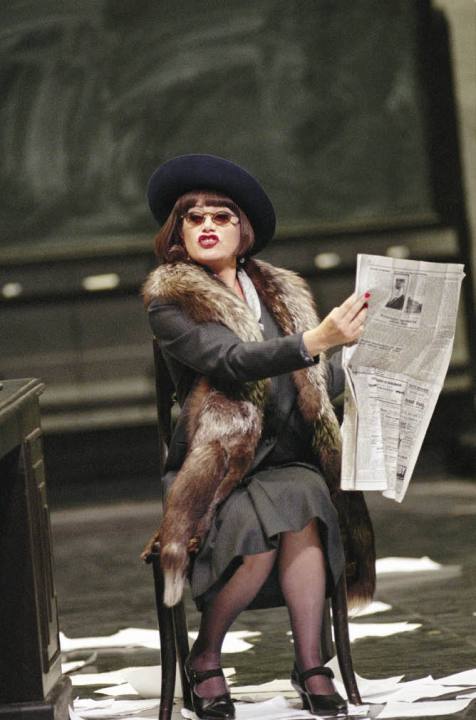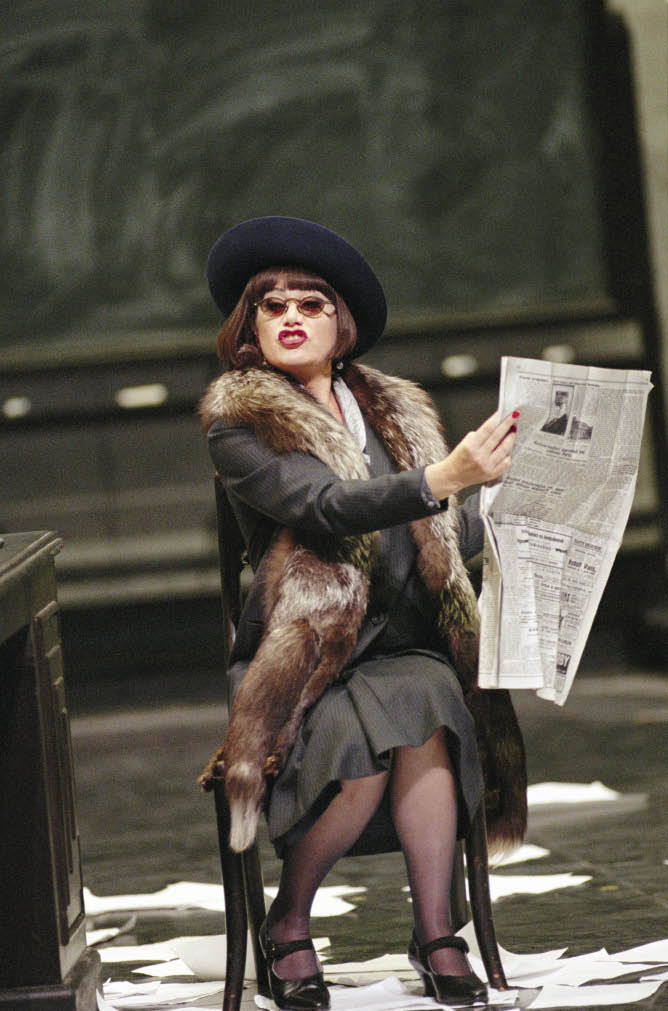English National Opera seems, at the start of the season, to be preoccupied, as we should all be, with how long we want to live, and in what kind of condition. In Janacek’s The Makropoulos Case the eponymous heroine is able, if she wants to, to live in a state of perpetual early maturity, but after 337 years decides to call it a day. In Gounod’s Faust the eponymous hero is feeling his years, and is offered back his youth by a diabolical force in return for his soul. Neither of these works, even in brilliant productions, advances the discussion much, but neither of the productions on offer is helpful, and Christopher Alden’s, of Makropoulos, seriously deflects attention away from where it should be directed.
Makropoulos is, for all its false scents and ridiculous legal complexities, about a superficial woman whose celebrity depends on her looks and her voice. It may be unkind to mention Anja Silja, who defined the role for us just as much as Callas did with Norma, but it is unavoidable: when Silja sang it, she was a veteran herself, a legendary man-eater, and a great beauty; at Glyndebourne, where I saw her, she embodied, generated and was encased in glamour, and that is crucial to the opera. She didn’t avoid, because it shouldn’t be possible to, making us ask the question: why don’t you try doing something more worthwhile with your time?
Emilia Marty, alias EM this and that, is so dedicated an exponent of celebrity that her weariness might strike her, if she were faintly reflective, as the result of having vulgar ideals rather than of the luck of living as long as she wants. In Alden’s production this issue is not so much as glanced at, because the opera is set in pre-1989 Eastern Europe, where many people didn’t want to live even a normal lifespan. The characters, not a fascinating lot anyway, are homogenised, with only Marty herself giving any colour to the scene or action.
Amanda Roocroft turns in a brilliant performance, revealing acting and vocal capacities previously unsuspected, but is she, most of the time, playing the right character? Often she seemed to be Lulu, a sex kitten who moves between being preyed on and preying with unnerving smoothness. Only in Act III, where all the glorious music of the opera is concentrated, did she seem to be EM and no one else; her final ecstatic disintegration (not that Alden allows us to see how complete that is) was magnificent.
Roocroft was surrounded by a uniformly excellent cast, and given all the lead and support she needed by Richard Armstrong, whose conducting may not yet match that of Charles Mackerras, to whom the performance was properly dedicated, but communicates most of what the score has to offer. After the surging prelude, though, isn’t much of the first two acts Janacek on automatic? By this stage he could produce paeans, fanfares, searing abrupt string melodies, fierce dislocations, at will, and they suit the text and action of Makropoulos very well. But is it possible to tell the difference between great and routine Janacek? Yes, but only when we get to Act III and hear music worthy of the composer of his late operatic masterworks. I don’t think this opera counts as one of them, despite the fascination of its subject and the opportunity it gives to an adequate performer to shine. But a less determinedly irrelevant production would help.
In the programme for Gounod’s Faust, in a new production by Des McAnuff, Faust is listed as ‘a scientist’, and the setting makes clear that the description is to be taken in a strict sense. Spiral staircases on each side of the stage are the permanent feature, but there are also large bombs, atomic and other, dangling, and many people in white coats looking as if they have escaped from a Clinique counter in Boots. That Goethe and some other employers of the Faust myth were anxious about how mankind could handle the limitless knowledge it has acquired is obvious; but isn’t it equally obvious that Gounod was, as usual, more concerned to titillate? And isn’t it offensive to have photos of Nagasaki, devastated, in the programme of this flimsy work?
Edward Gardner gave a grave, even ponderous account of the score, which the orchestra played superbly, but Gounod can hardly bear this weight. Toby Spence is a youthful, ardent Faust, but an incorrigibly English one. The star of this fun piece, as it should be, is Iain Paterson as Mephistopheles, despite having a severe lung infection. He is hissably sinister, rock-solid in tone, and a great pantomime villain. Melody Moore’s Marguerite doesn’t do a lot with a pallid role. It’s a fairly enjoyable affair, but would be a lot more if it didn’t pretend to be so serious.







Comments